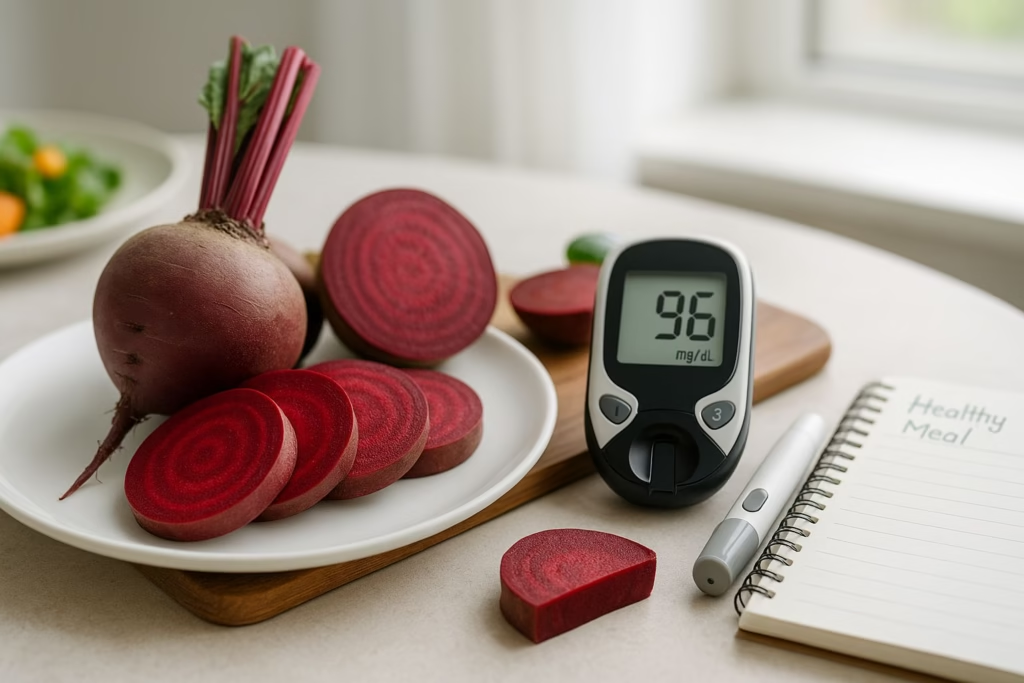People with diabetes often wonder if they can safely eat beetroot without causing blood sugar spikes. Beetroot can be beneficial for people with diabetes when consumed in moderation, as it may help lower blood sugar levels and reduce diabetes-related complications.
This colorful root vegetable contains compounds that show promise for blood sugar management and overall health.

Research suggests beetroot may help regulate glucose and insulin in the body. The vegetable contains natural nitrates and antioxidants that could support better blood circulation and reduce inflammation.
These properties make beetroot an interesting addition to a diabetic meal plan. Understanding how beetroot affects blood sugar, its nutritional benefits, and potential risks helps people with diabetes make informed choices.
The key lies in knowing the right portions and preparation methods to maximize benefits while maintaining stable glucose levels. But let’s be honest, finding that balance can be tricky sometimes.
Key Takeaways
- Beetroot may help lower blood sugar levels and reduce insulin resistance when eaten in appropriate portions
- The vegetable provides antioxidants and nitrates that can improve circulation and reduce diabetes complications
- People with diabetes should monitor portions carefully since beetroot contains natural sugars that can affect blood glucose
How Beetroot Affects Blood Sugar in Diabetes

Beetroot influences blood sugar through multiple pathways. Its natural compounds help regulate glucose responses, while the fiber content slows sugar absorption.
This vegetable has a moderate glycemic index but offers beneficial nitrates and antioxidants that support blood sugar control.
Blood Sugar Regulation Mechanisms
Beetroot contains phytochemicals that directly impact how your body processes glucose. Research shows that drinking beetroot juice can suppress post-meal glucose levels in healthy people.
The nitrates in beetroot play a key role here. These compounds may help reduce insulin resistance by improving how your cells respond to insulin signals.
Nitrate metabolites found in high concentrations in beetroot show up in lower levels in people with insulin resistance and prediabetes. That suggests eating beetroot could help restore proper insulin function.
A 2017 study found that people with obesity who consumed beet juice with carbs showed better insulin sensitivity compared to those without obesity. Results really do vary between studies, and honestly, there’s a need for more research focused on people with diagnosed diabetes.
The antioxidants in beetroot, especially betalains, help reduce oxidative stress. That can interfere with normal blood sugar regulation mechanisms.
Glycemic Index and Glycemic Load of Beetroot
Beetroot has a moderate glycemic index of 61. This means it raises blood sugar at a medium rate compared to pure glucose.
But the glycemic load tells a more complete story. The glycemic load of beetroot stays relatively low because of its high water content and moderate carb density.
One medium beet contains about 7 grams of carbohydrates.
| Measure | Value |
|---|---|
| Glycemic Index | 61 (moderate) |
| Carbs per beet | ~7 grams |
| Glycemic Load | Low to moderate |
Beetroot’s low glycemic load means it does not spike blood sugar levels significantly when eaten in normal portions. The natural sugars in beetroot include fructose, which has less immediate impact on blood glucose than table sugar.
Role of Dietary Fiber in Blood Sugar Control
Beetroot provides a good amount of dietary fiber that slows down carb absorption and helps stabilize blood sugar. This fiber creates a protective effect against rapid glucose spikes.
The fiber in beetroot forms a gel-like substance in your digestive tract. That delays sugar absorption into the bloodstream, helping prevent those sharp blood sugar rises that can be a real headache for people with diabetes.
Soluble fiber specifically helps improve glucose tolerance by slowing gastric emptying. Food moves more slowly from the stomach to the small intestine, so sugars release at a steadier rate.
Pairing beetroot with other high-fiber veggies enhances blood sugar management by creating an even more effective barrier against rapid glucose absorption.
The combo provides sustained energy without dramatic blood sugar swings. The fiber content also supports overall digestive health, which actually plays a bigger role in stable blood sugar patterns than most people realize.
Key Health Benefits of Beetroot for Diabetics

Beetroot provides several health advantages for people with diabetes through its unique mix of nitrates, antioxidants, and potassium.
These compounds work together to improve insulin function, protect against cellular damage, and support heart health.
Effects on Insulin Sensitivity and Resistance
Beetroot has high levels of nitrates that may help reduce insulin resistance in diabetic patients.
A 2017 study found that people with obesity who consumed beet juice with carbs showed lower insulin resistance compared to those without obesity. The nitrate content in beetroot seems key for improving insulin sensitivity.
Research shows that people with insulin resistance have lower blood nitrate levels than healthy individuals. A 2014 study showed that drinking 225 milliliters of beetroot juice resulted in significant suppression of post-meal glucose levels.
This suggests beetroot juice may help the body process sugar more effectively. But, results are mixed. A small 2013 study of 27 people with type 2 diabetes found no improvement in insulin resistance after drinking beetroot juice daily.
Antioxidants and Reduction of Oxidative Stress
Beetroot is packed with powerful antioxidants called betalains, which give it that deep red color. These compounds fight free radicals that cause oxidative stress in your body.
One study found beets contain up to 1.7 millimoles of antioxidants per 3.5 ounces. This high antioxidant content helps protect your cells from damage.
For people with diabetes, reducing oxidative stress is especially important. Diabetes can damage both small and large blood vessels throughout the body.
Lower oxidative stress means less risk of diabetes complications like:
- Eye damage (retinopathy)
- Kidney disease
- Nerve damage (neuropathy)
- Heart disease
The anti-inflammatory compounds in beetroot also help suppress inflammation linked to serious medical conditions.
Blood Pressure and Cardiovascular Health
High blood pressure is common in people with diabetes, so cardiovascular health is a big concern. Beetroot juice shows promise for lowering blood pressure thanks to its nitrate content.
A 2013 study found that people with hypertension who drank one cup of beetroot juice daily experienced significant drops in blood pressure.
The nitrates in beet juice work by expanding blood vessels and improving blood flow. The same study showed improved elasticity in blood vessels and reduced systolic blood pressure levels, which measures the force when the heart beats.
More recent research from 2017 found that nitrates in beetroot juice reduced central blood pressure in some people with type 2 diabetes. Central blood pressure refers to pressure in the aorta, the main artery carrying blood from the heart.
Beetroot also contains potassium, which supports healthy circulation and heart function. Better blood flow helps reduce the risk of cardiovascular complications that are all too common in diabetes.
Essential Nutrients and Compounds in Beetroot

Beetroot contains a unique combination of vitamins, minerals, and plant compounds that may help people with diabetes manage their blood sugar. The root provides folate, potassium, and special antioxidants called betalains that give beets their deep red color.
Vitamins and Minerals for Diabetes Management
Beetroot provides several key nutrients that support diabetes management. Beetroot is full of folates, potassium, and other nutrients that benefit overall health.
Folate helps your body make healthy red blood cells. It also supports proper cell function and may help reduce inflammation in people with diabetes.
Potassium plays a vital role in blood pressure control. People with diabetes often have high blood pressure, so this mineral is especially important.
The vegetable also has vitamin C, which acts as an antioxidant. This vitamin helps protect cells from damage and supports immune function.
Iron in beetroot helps carry oxygen throughout your body. It is also a good source of calcium, magnesium, copper, phosphorus, sodium and iron.
Calcium supports bone health. People with diabetes have a higher risk of bone problems, making adequate calcium intake important.
Phytochemicals and Bioactive Components
Beetroot packs in powerful plant compounds that might help with diabetes control. Beets are loaded with phytochemicals that seem to regulate glucose and insulin in humans.
Betalains give beetroot that unmistakable red color. They act as antioxidants and might help calm inflammation in the body.
One 2010 study found beets can have up to 1.7 millimoles of antioxidants per 3.5 ounces.
Nitrates in beetroot could help reduce insulin resistance. Your body turns nitrates into nitric oxide, which relaxes blood vessels and improves blood flow.
Raw beetroot holds onto more of these helpful compounds than cooked beetroot. Cooking tends to break down some of the more delicate phytochemicals.
Fiber and Digestive Health
Beetroot offers dietary fiber that slows sugar absorption. This makes it a pretty smart choice for blood sugar management if you have diabetes.
Dietary fiber slows the body’s absorption of carbs, which helps prevent those annoying blood glucose spikes after meals.
One medium beetroot gives you about 2 grams of fiber. That’s a decent chunk toward your daily needs for diabetes control.
The fiber in beetroot also feeds good gut bacteria. This can boost metabolism and support blood sugar regulation.
Fiber keeps you feeling full longer after eating. That’s handy for weight management, which matters a lot when you’re dealing with diabetes.
Potential Risks and Considerations for Diabetics
Beetroot brings plenty of benefits for people with diabetes, but it’s not all upside. You’ve got to consider its carb content and a few possible side effects. The vegetable contains natural sugars and compounds that might cause problems for some folks.
Carbohydrate Content and Portion Control
A medium beetroot contains about 7 grams of carbohydrates. That includes natural sugars, which can nudge your blood glucose up.
Diabetics need to count these carbs in their daily total. A half-cup of cooked beetroot has around 8-10 grams of carbs.
Recommended portion sizes:
- Fresh beetroot: 1/2 cup cooked
- Beetroot juice: 4-6 ounces max
- Raw beetroot: 1/3 cup shredded
Beets contain fructose, which can push blood sugar higher. If you have diabetes, check your blood glucose after eating beetroot to see how you react.
The fiber in beetroot helps slow sugar absorption, but beetroot juice doesn’t have that fiber and might spike blood sugar faster than the whole veggie.
Kidney Stones and Oxalates
Beetroot is high in oxalates, natural compounds in many veggies. Oxalates can trigger kidney stones if you’re susceptible.
If you’ve had kidney stones before, limit beetroot. Its high oxalate content raises risk for stone formation.
High-risk individuals include:
- People who’ve had kidney stones
- Those with kidney disease
- Anyone with hyperoxaluria
Diabetics already face higher kidney disease risk. Eating lots of high-oxalate foods like beetroot could make things worse for some.
Drinking plenty of water when you eat beetroot can dilute oxalates in your urine. Eating beetroot with calcium-rich foods may also help by binding oxalates before your body absorbs them.
Beeturia and Other Side Effects
Beeturia makes urine or stools turn pink or red after eating beetroot. Around 10-14% of people get this harmless effect.
The red color comes from betalain compounds. Beeturia usually clears up in a day or two and doesn’t hurt you.
Some people get stomach issues if they eat too much beetroot. Think upset stomach, diarrhea, or mild digestive trouble.
Possible side effects:
- Pink or red urine
- Colored stools
- Stomach upset
- Mild digestive issues
Start with small servings to see how your body handles it. If your stomach is sensitive, go slow when adding beetroot to your meals.
Practical Tips for Including Beetroot in a Diabetic Diet
Getting the most from beetroot for diabetes really comes down to picking the right form, watching your portions, and pairing it with foods that help steady your blood sugar.
Raw vs. Cooked vs. Juice: Optimal Ways to Consume
Raw beetroot gives you the most fiber and the gentlest impact on blood sugar. That fiber slows down sugar absorption and helps your gut, too.
Cooked beetroot has a slightly higher glycemic index, but it’s still a good option. Roasting or steaming keeps most nutrients intact and makes beets easier to digest.
Beetroot juice is trickier for blood sugar. Juicing strips away most of the fiber that would normally help keep glucose in check. Beetroot juice can boost blood flow, but you really need to limit how much you drink.
If you’re managing diabetes, stick with whole beetroot instead of juice. If you do have juice, water it down or mix it with some protein to blunt the sugar hit.
Recommended Portions and Meal Timing
The sweet spot for diabetics is about 100-150 grams of cooked beetroot per serving. That gives you the good stuff without causing big blood sugar jumps.
If you’re drinking beetroot juice, keep it to 100-150 milliliters a day. More than that and you might see unwanted glucose spikes.
Timing really matters for blood sugar. Eating beetroot with a meal—rather than by itself—helps soften its impact. Other foods slow down digestion and sugar absorption.
Try not to eat beetroot on an empty stomach. Having it with breakfast or lunch seems to work better for most people than eating it at night.
Combining Beetroot with Other Diabetes-Friendly Foods
Pairing beetroot with protein is a smart move. Toss in some grilled chicken, tofu, or Greek yogurt to help steady your blood sugar and keep you full longer.
Healthy fats like avocado, nuts, or olive oil also slow sugar absorption. These combos make for more balanced meals that can help manage diabetes over time.
Leafy greens with beetroot make nutrient-packed salads. Spinach, kale, or arugula go well with beetroot’s earthy taste and add hardly any carbs.
Whole grains bring even more fiber to the table. Mix beetroot with quinoa, brown rice, or oats for filling meals that support your immune system and overall health.
Steer clear of pairing beetroot with sugary fruits or refined carbs. Those combinations can really mess with your blood sugar.
Frequently Asked Questions
People with diabetes usually have a lot of questions about beetroot. The main things to think about are portion control, how you prepare it, and when you eat it—all of which affect blood sugar stability.
Can people with diabetes safely consume beetroot?
Yes, people with diabetes can eat beetroot safely if they don’t go overboard. Beetroot has a low glycemic load and usually won’t cause big blood sugar spikes.
This veggie brings fiber, vitamins, and minerals to the table. Still, it’s smart to check your blood sugar when you first add beetroot to your meals.
Fresh beetroot is your best bet compared to processed forms. Eat beetroot in small portions, ideally with fiber-rich foods to slow down sugar absorption.
How does beetroot juice affect blood sugar levels in individuals with type 2 diabetes?
Beet juice has a low glycemic index, so it raises blood sugar gradually—not in big leaps. That makes it more suitable than high-GI foods for people with type 2 diabetes.
The juice might improve insulin sensitivity for some folks. Better insulin sensitivity means your body uses insulin more efficiently, which is crucial for managing type 2 diabetes.
Stick to 100-150 ml of beet juice per serving. Always check your blood sugar after drinking it to see how your body responds.
Is it advisable for diabetics to include pickled beetroot in their diet?
Pickled beetroot often comes with extra sugar and salt—bad news for diabetics. Pickling can bump up the sugar content compared to fresh beetroot.
Read nutrition labels carefully if you’re buying pickled beetroot. Many brands sneak in a lot of added sugar, which can spike blood glucose.
Fresh or roasted beetroot is usually a better pick than pickled. If you do go for pickled, choose versions with no added sugar and keep your portions tiny.
What are the sugar content implications for diabetics when consuming beets?
Beetroot has natural sugars, but the levels are moderate compared to other root veggies. The fiber in whole beetroot helps slow down how fast your body absorbs those sugars.
One medium beetroot has about 6-8 grams of natural sugar. Most diabetics can handle this amount as part of a balanced meal.
Beetroot might nudge blood sugar up a little, but if you stick to healthy portions, the effect is usually small. The trick is to watch your own numbers and adjust as needed.
Are there any benefits of drinking beetroot juice for diabetes management?
Beetroot juice might help boost blood flow and lower blood pressure since it’s packed with nitrates. Diabetics already deal with higher heart risks, so that could be a pretty big deal.
The antioxidants in beetroot juice work to shield your body from oxidative stress. This protection can lower the chance of diabetes-related issues like nerve pain or vision trouble.
Some research hints that beetroot juice may give your exercise performance a nudge by helping your body use oxygen more efficiently. If you can move more, it gets a bit easier to keep blood sugar in check through activity.
How can diabetics incorporate beetroot into their meals without affecting their blood sugar?
Diabetics can pair beetroot with protein and healthy fats to slow down sugar absorption. Try tossing beetroot with nuts, seeds, or some grilled chicken for a steadier blood sugar response.
Keeping an eye on portions really matters here. Usually, half a cup of cooked beetroot or just one small raw beetroot does the trick.
Some people find it helpful to eat beetroot before meals to support blood sugar control. It’s worth chatting with your healthcare provider to figure out what timing fits best with your meds and daily routine.



